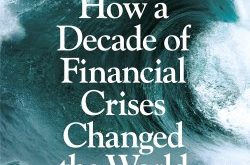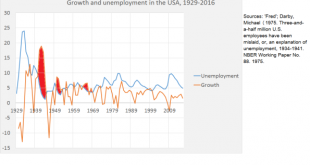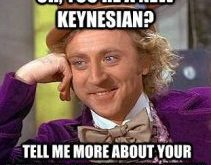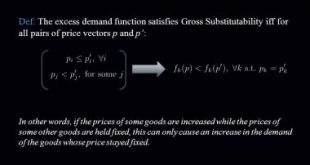from Lars Syll What kind of financial system do we want? What function should it have? What kind of financial activity do we want to permit or even encourage? These are essential questions for the shaping of economic and social policy at a national and global level. If we leave these questions up to the private sector, we expose ourselves to enormous risks. On the basis of our experience of 2008, we know how to master a massive heart attack in the banking system. But we also know how...
Read More »D. Trump lies, again. But he has a point. A HUGE one.
According to D. Trump “The GDP rate (4,2%) is higher than the unemployment rate (3,9%) for the first time in over 100 years!”. This tweet. Comparing the rate of GDP growth with the unemployment rate surely is interesting. And situations where the unemployment rate is lower than the rate of growth (U<G) are rare and remarkable as well as agents of change. D. Trump is wrong about the economic history of these events (graph). During WW II as well as during quite some years in the fifties...
Read More »The housing bubble and financial crisis was easy to see coming
from Dean Baker Ten years ago we saw the culmination of a period of ungodly economic mismanagement with the collapse of Lehman Brothers and a full-fledged financial crisis. The folks who led us into this disaster rushed to do triage and tend to the most important problem: saving the bankrupt banks. They also had to cover their tracks. They insisted that the financial crisis was some sort of fluke event — a lot of bad things went wrong simultaneously — and who could have predicted or...
Read More »Economics needs a new Reformation
from Lars Syll A more pluralist approach would take account of the complexity of markets, the constraints imposed by nature and rising inequality. So what needs to be done? Firstly, listen to consumers, because it is pretty obvious that they are unimpressed with what they are getting. The failure of the economics establishment to predict the crisis and its insistence that austerity is the right response to the events of a decade ago has meant the profession has rarely been less trusted …...
Read More »Yves Mersch, ECB banker: we really don’t care (about house price inflation)
There we go again. According to mister Mersch, a central banker, the ECB only has to care about consumer price inflation and not about financial stability. Mister Mersch knows this isn’t right. Legally, the ECB do has to care about financial stability. It’s part of the mandate of the bank. In a practical sense, caring about financial stability is what central banks do. While they do not excel at influencing the rate of consumer price inflation (which is influenced by wages, profit...
Read More »Dean Baker – Every Time We Run – Copyright 2018 – Final Cut
IG: DEANRAVENBAKER Song: Every Time We Run Band name: Alter Ego Music Australia. Band Members: Dean Baker (vocals), Dan Bacon (guitar), Matty Ray (keys), Mike Walker Coulter (drums). The band was highly inspired by the likes of The Doors, Tea Party, Rolling Stones and INXS. "Alter Ego Music Australia eternalized its illusionary psychedelic rock blues sound through the evocation of the true self". - Dean Baker. This original song was first recorded around the year 1999-2000 and unlike...
Read More »Secular stagnation and failed interpretations of Keynes
from Lars Syll Commenting on the Stiglitz-Summers debate on secular stagnation, Roger Farmer writes: We cannot continue to make unfounded assertions about economic policy using the failed interpretation of the General Theory that evolved from John Hicks’ attempt to reconcile Keynes with the classics. The current manifestation of that approach is so-called New Keynesian Economics, which Summers himself has rightly rejected because it is inconsistent with secular stagnation. But it is not...
Read More »Summary of Stiglitz on monetary policy
from Asad Zaman After the Global Financial Crisis, there has been a lot of re-thinking about Monetary Policy, as one might expect. In fact, in light of the magnitude of the failure, re-thinking efforts have been much less than proportional. There are many, many, different strands of thought, and personally, I do not have clarity on what needs to be done. Furthermore, the situation is rapidly changing, so that a solution for today would not be a solution for tomorrow. The fundamental...
Read More »The gross substitution axiom
from Lars Syll Economics is perhaps more than any other social science model-oriented. There are many reasons for this — the history of the discipline, having ideals coming from the natural sciences (especially physics), the search for universality (explaining as much as possible with as little as possible), rigour, precision, etc. Mainstream economists want to explain social phenomena, structures and patterns, based on the assumption that the agents are acting in an optimizing (rational)...
Read More »Complexity in economics
from Maria Alejandra Madi Traditional epistemological theories have fostered an endless debate on dichotomies characterized by forms of objectivism, on the one hand, and forms of relativism/skepticism on the other. Currently, among the deep global social and cultural challenges, the crisis in epistemology is characterized by a radical questioning of the whole matrix within which such dichotomies have been drawn. Taking into account the evolution of Economics as a science, the need for a...
Read More » Real-World Economics Review
Real-World Economics Review






